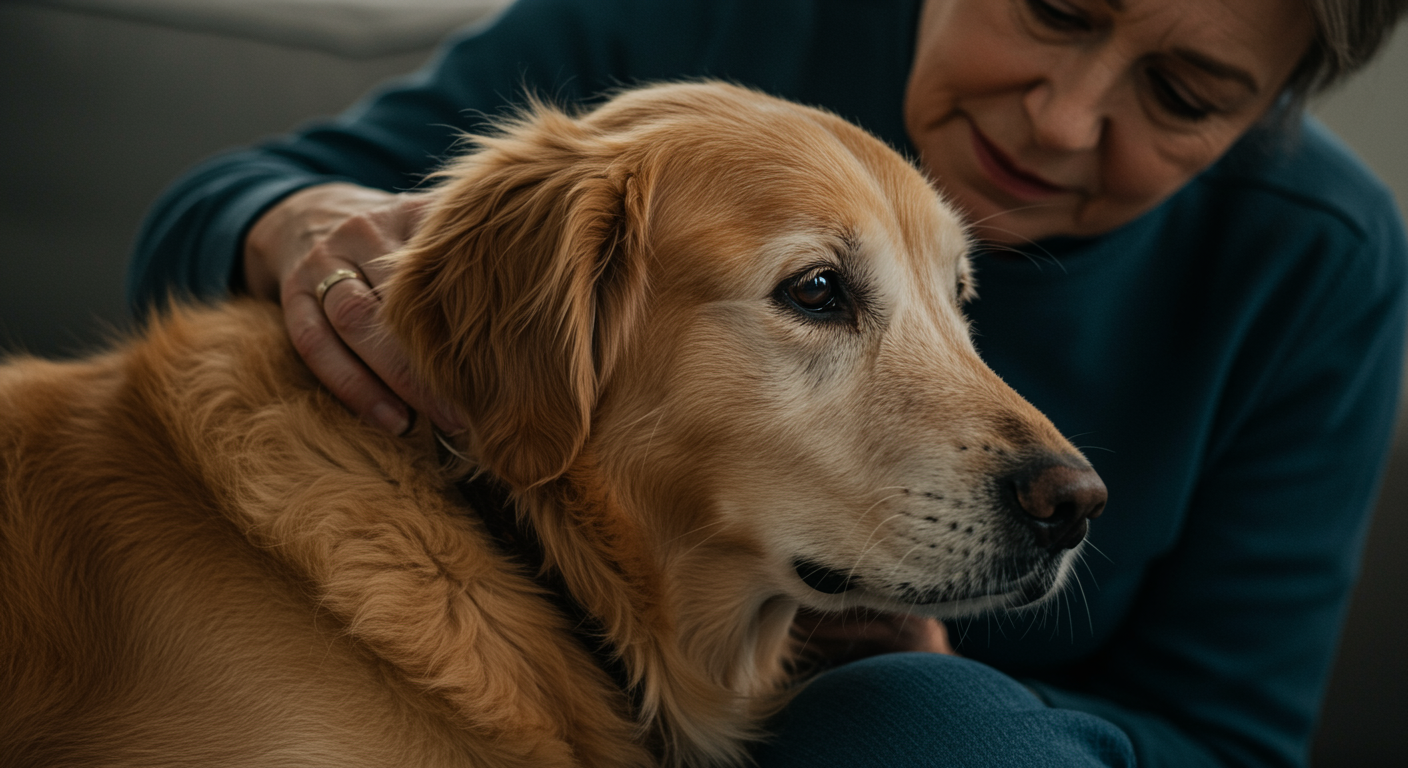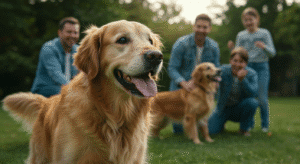Sharing life with a Golden Retriever from puppyhood through their senior years creates a profound journey of growth, learning, and deepening love that transforms both dog and owner in unexpected ways. This personal journey reveals how the experience of aging alongside a beloved companion teaches valuable life lessons while creating bonds that transcend the typical pet-owner relationship.
The aging journey with a Golden Retriever unfolds gradually, marked by subtle changes that eventually reshape daily routines, priorities, and perspectives on what truly matters in life. These experiences create shared memories and mutual understanding that enrich both lives while preparing families for the inevitable challenges and precious moments that define the senior years.
Understanding one family’s personal journey through their Golden Retriever’s aging process provides insight into the emotional, practical, and spiritual aspects of senior dog companionship while offering hope and guidance for others navigating similar paths with their beloved companions.
The Early Signs: Recognizing the Beginning of Change
Subtle Transformations
First Gray Hairs and Slower Mornings
The journey into senior years often begins with barely noticeable changes – a few gray hairs around the muzzle, slightly longer morning stretches, or a preference for softer beds that signal the beginning of a new life chapter.
For Sarah and her Golden Retriever Max, these first signs appeared around his seventh birthday, initially dismissed as normal variations in daily routine rather than indicators of significant life changes approaching.
“I remember thinking Max was just being lazy when he started sleeping in longer,” Sarah recalls. “It took months before I realized that those extra minutes of stretching each morning were his body’s way of working through new stiffness.”
The gradual nature of these changes made them easy to overlook initially, but looking back, Sarah recognizes them as the beginning of Max’s transformation from adult to senior companion, marking the start of a journey that would reshape their relationship.
These early signs taught Sarah to pay closer attention to subtle changes while beginning to adjust expectations and routines to accommodate Max’s evolving needs and preferences.
Shifting Activity Preferences
As Max entered his senior years, his preferences for activities began shifting in ways that initially puzzled but eventually educated his family about the natural aging process and changing needs.
“Max used to be obsessed with fetch and could play for hours,” Sarah explains. “Gradually, he became more interested in sniffing around the yard or just lying in sunny spots, which I initially worried meant he was becoming lazy or depressed.”
Understanding that these preference changes reflected wisdom and comfort-seeking rather than decline helped Sarah adapt activities while respecting Max’s evolving interests and energy levels.
The family learned to appreciate Max’s new preferences for gentle exploration, comfortable rest, and peaceful observation, discovering that these quieter activities could be just as bonding and enjoyable as previous high-energy play.
This shift in activities taught Sarah that aging doesn’t mean loss of enjoyment, but rather evolution toward different types of pleasure and satisfaction that can be equally meaningful and rewarding.
Emotional Adjustments
Processing Initial Concerns
The first recognition that Max was aging brought a complex mix of emotions for Sarah – sadness about time passing, worry about future challenges, and determination to make his senior years as wonderful as possible.
“When I first really noticed that Max was getting older, I went through a kind of grief process,” Sarah admits. “I mourned the loss of his puppyhood and worried constantly about what aging would bring.”
Working through these initial emotional responses helped Sarah develop healthier perspectives on aging while focusing on gratitude for time shared rather than anxiety about time remaining.
The family learned that acknowledging sadness about aging was normal and healthy, but that dwelling on future concerns prevented them from fully enjoying current experiences and opportunities.
This emotional processing taught Sarah that aging anxiety often stems from focusing on unknowns rather than appreciating present moments and current capabilities that still provide joy and connection.
Shifting Priorities and Perspectives
Recognizing Max’s aging process prompted Sarah to examine her own priorities, leading to lifestyle changes that benefited both her and Max while strengthening their bond and daily experiences.
“Caring for senior Max taught me to slow down and appreciate simple moments that I used to rush past,” Sarah reflects. “His need for patience taught me patience, and his contentment with small pleasures helped me find satisfaction in everyday experiences.”
The family began prioritizing quality time over productivity, choosing activities that supported Max’s comfort while creating meaningful shared experiences that enriched their relationship.
These priority shifts extended beyond dog care, influencing Sarah’s approach to work, relationships, and personal well-being in ways that improved overall life satisfaction and family harmony.
Personal Journey Through Senior Golden Retriever Care
| Life Stage | Duration | Key Changes | Family Adaptations | Lessons Learned | Emotional Growth |
|---|---|---|---|---|---|
| Early Senior (7-9 years) | 2 years | Subtle slowdown, preference changes | Activity modifications, routine adjustments | Patience, observation skills | Acceptance of aging process |
| Mid-Senior (9-12 years) | 3 years | Health monitoring needs, mobility support | Medical management, home modifications | Advocacy, care coordination | Deeper appreciation for time |
| Late Senior (12+ years) | Ongoing | Increased care needs, quality focus | Comprehensive support, comfort priority | Love expression through care | Profound gratitude, peace |
Navigating Health Challenges Together
First Medical Concerns
Learning to Advocate
When Max developed arthritis around age nine, Sarah found herself thrust into the role of medical advocate, learning to communicate with veterinarians, research treatment options, and make informed decisions about care approaches.
“I had to become Max’s voice,” Sarah explains. “Learning to ask the right questions, understand treatment options, and make decisions based on his comfort rather than my fears was a huge learning experience.”
This advocacy role taught Sarah valuable skills about medical communication, decision-making under uncertainty, and balancing hope with realistic expectations that served her well in other life areas.
The experience of navigating Max’s health care helped Sarah develop confidence in medical settings while building stronger partnerships with healthcare providers who supported both Max’s needs and the family’s values.
Learning to advocate effectively for Max’s needs prepared Sarah for future health challenges while teaching her that good advocacy involves listening, learning, and maintaining focus on the patient’s best interests.
Medication Management and Daily Care
Managing Max’s daily medications, monitoring his response to treatments, and coordinating care activities became integral parts of Sarah’s routine, teaching valuable lessons about consistency, observation, and patience.
“At first, the medication schedule felt overwhelming,” Sarah admits. “But it became a way of showing love and care, and I learned to see each pill as an act of devotion rather than a burden.”
The daily care routines helped Sarah develop better organizational skills while creating structure that benefited both her and Max, providing predictability and security during uncertain times.
These caregiving responsibilities taught Sarah about the satisfaction that comes from providing needed care while demonstrating love through consistent, thoughtful attention to Max’s comfort and well-being.
The experience of managing complex care needs built Sarah’s confidence in her ability to handle challenging situations while strengthening her bond with Max through shared daily routines.
Adapting to Changing Needs
Home Modifications and Lifestyle Changes
As Max’s mobility decreased, Sarah found herself redesigning their living space to accommodate his needs, discovering how environmental modifications could dramatically improve quality of life and independence.
“Installing ramps and non-slip rugs felt like admitting defeat initially,” Sarah recalls. “But seeing how much they helped Max maintain his confidence and independence made me realize these changes were gifts, not concessions.”
The home modifications taught Sarah about universal design principles while creating a more accessible, comfortable environment that benefited all family members, not just Max.
These adaptations helped Sarah understand that accommodation and support can enhance rather than diminish dignity, changing her perspectives on aging and assistance in her own life.
The process of modifying their environment strengthened Sarah’s problem-solving skills while demonstrating how creative solutions can maintain quality of life despite physical limitations.
Activity Adaptations and New Discoveries
Modifying activities to accommodate Max’s changing capabilities led to discovering new forms of enjoyment and bonding that enriched their relationship in unexpected ways.
“When Max couldn’t do long hikes anymore, we started taking scenic car rides to different parks where he could enjoy short, gentle walks,” Sarah explains. “These became some of our most treasured times together.”
Activity adaptations taught Sarah about flexibility and creativity while showing how limitations can lead to new discoveries and different types of meaningful experiences.
The family learned that adaptation doesn’t mean loss, but rather evolution toward new forms of enjoyment that can be equally satisfying and meaningful as previous activities.
These modified activities often became more intimate and focused, creating deeper connections and more mindful experiences than the busier activities of Max’s younger years.
Deepening Bonds and Understanding
Daily Rhythms and Routines
Morning Rituals and Peaceful Moments
As Max aged, morning routines became more important and meaningful, creating special times for connection and assessment while starting each day with love and attention.
“Our morning routine became sacred time,” Sarah reflects. “Max needed extra time to stretch and wake up, which gave us quiet moments together that set a peaceful tone for the whole day.”
These morning rituals taught Sarah about the value of unhurried time while creating opportunities for observation and connection that might have been missed in busier periods.
The slower pace of morning activities helped Sarah develop mindfulness and presence while appreciating the simple pleasure of companionship and mutual care.
These daily rituals became anchors of stability and love that provided security and comfort for both Sarah and Max during times of change and uncertainty.
Evening Comfort and Connection
Evening routines focused on Max’s comfort became opportunities for reflection, gratitude, and peaceful bonding that ended each day with expressions of love and care.
“Helping Max settle comfortably each evening became a meditation on gratitude,” Sarah explains. “I would think about the day’s moments together while making sure he was comfortable and secure.”
Evening care routines taught Sarah about the satisfaction of providing comfort while creating opportunities for daily gratitude practice that improved her overall well-being and life satisfaction.
These quiet evening moments often became times for reflection on the day’s experiences and appreciation for the ongoing gift of Max’s companionship and love.
The consistency of evening comfort routines provided security for Max while giving Sarah structured time for processing emotions and experiences related to their aging journey together.
Communication and Understanding
Non-Verbal Connection
As Max aged, Sarah became increasingly skilled at reading his non-verbal communication, developing intuitive understanding of his needs, preferences, and emotional states.
“I learned to read Max’s expressions and body language in ways I never had before,” Sarah notes. “His subtle signals became a language we shared that went beyond words.”
This enhanced communication deepened their relationship while teaching Sarah valuable lessons about attention, empathy, and the importance of really seeing and understanding those we love.
The development of intuitive communication skills enriched Sarah’s relationships with other family members and friends, as she learned to pay closer attention to non-verbal cues and emotional needs.
This deeper understanding created a sense of partnership and mutual care that transcended typical pet-owner relationships, becoming a profound interspecies friendship based on respect and love.
Mutual Comfort and Support
Sarah discovered that the comfort and support flowed both ways, with Max providing emotional stability and peace during stressful periods in her own life.
“Max’s calm presence during difficult times in my life taught me about resilience and staying grounded,” Sarah reflects. “His peaceful acceptance of challenges helped me handle my own stress better.”
The mutual support system that developed taught Sarah about the reciprocal nature of loving relationships while demonstrating how caring for others often provides as much benefit to the caregiver.
This experience of mutual comfort helped Sarah understand that vulnerability and interdependence are strengths rather than weaknesses, changing her approach to relationships and self-care.
The recognition that Max was also caring for her during his senior years added depth and meaning to their relationship while teaching valuable lessons about love’s multidirectional nature.
Facing Difficult Decisions and Changes
Quality of Life Considerations
Learning to Assess and Prioritize
As Max’s needs became more complex, Sarah learned to assess quality of life objectively while making decisions based on his comfort and happiness rather than her own emotional needs.
“Learning to separate my fears from Max’s actual needs was one of the hardest parts of the journey,” Sarah admits. “I had to focus on his experience rather than my anxiety about losing him.”
This objective assessment taught Sarah valuable decision-making skills while helping her understand the difference between quality and quantity of life in ways that influenced her own life choices.
The process of quality of life evaluation helped Sarah develop better judgment and decision-making abilities while learning to prioritize what truly matters in daily experiences.
These skills in assessment and prioritization benefited Sarah’s approach to other life challenges while teaching her to focus on meaningful experiences rather than simply extending time.
Medical Decision Making
Making complex medical decisions for Max taught Sarah about researching options, weighing benefits and risks, and making informed choices under emotional pressure.
“Each medical decision felt enormous,” Sarah recalls. “But I learned to gather information, consult with professionals, and then trust my judgment about what would be best for Max.”
The experience of medical decision-making built Sarah’s confidence in handling difficult choices while teaching her to balance emotion with logic in important life decisions.
These decision-making experiences prepared Sarah for other challenging situations while demonstrating the importance of advocacy, research, and professional consultation.
Learning to make difficult decisions for Max’s benefit taught Sarah about putting loved ones’ needs first while finding strength in challenging circumstances.
Preparing for Transitions
Emotional Preparation and Acceptance
Preparing emotionally for Max’s eventual passing became an ongoing process that taught Sarah about grief, acceptance, and finding meaning in limited time together.
“I learned that preparing for loss doesn’t mean giving up hope, but rather appreciating each day while acknowledging that our time together is precious because it’s finite,” Sarah explains.
This emotional preparation helped Sarah live more fully in the present while reducing anxiety about the future and increasing gratitude for current experiences.
The process of accepting mortality helped Sarah develop healthier relationships with uncertainty while finding peace in focusing on love and care rather than control over outcomes.
Learning to balance hope with acceptance taught Sarah valuable life skills while helping her support Max through his aging process with strength and peace.
Creating Meaningful Memories
The awareness of limited time motivated Sarah to create special memories and meaningful experiences that celebrated their relationship while honoring Max’s life and their journey together.
“Knowing our time was precious made me more intentional about creating special moments,” Sarah reflects. “Every walk, every quiet evening together became something to treasure.”
This focus on memory-making enriched their daily experiences while teaching Sarah to find significance in ordinary moments that might otherwise pass unnoticed.
The intentional creation of meaningful experiences helped Sarah develop better appreciation for daily life while building a treasury of positive memories that provide lasting comfort.
These memory-making efforts demonstrated how awareness of mortality can enhance rather than diminish life satisfaction by increasing gratitude and intentionality in relationships.
Lessons in Love and Letting Go
Understanding Unconditional Love
Receiving and Giving
Max’s consistent love and acceptance throughout his aging process taught Sarah about unconditional love while showing her how to provide the same kind of steady, unwavering support.
“Max loved me the same whether I was having a good day or bad day, whether I made mistakes in his care or did everything perfectly,” Sarah notes. “That taught me what real love looks like.”
This experience of unconditional love changed Sarah’s approach to all her relationships while helping her understand that true love isn’t dependent on performance or circumstances.
Learning to provide unconditional care for Max taught Sarah about love as action rather than just feeling, demonstrating how consistent care expresses love even during difficult times.
The experience of giving and receiving unconditional love enriched Sarah’s understanding of relationships while teaching her about the transformative power of steady, consistent affection.
Service as Love Expression
Providing daily care for Max taught Sarah that service is one of the highest expressions of love, transforming caregiving from burden into privilege and honor.
“Taking care of Max became a way of saying ‘I love you’ every day,” Sarah explains. “Each medication, each comfortable positioning, each gentle touch was a love letter.”
This understanding of service as love expression changed Sarah’s approach to relationships while helping her find meaning and satisfaction in providing care for others.
The daily acts of service taught Sarah about the joy that comes from putting someone else’s needs first while demonstrating love through consistent, thoughtful action.
Learning to see caregiving as love expression rather than obligation transformed Sarah’s experience while teaching her valuable lessons about the nature of meaningful relationships.
Finding Peace in Impermanence
Accepting Life’s Natural Cycles
Max’s aging process taught Sarah to accept life’s natural progression while finding beauty and meaning in each stage rather than fighting against inevitable changes.
“Watching Max age gracefully taught me that every stage of life has its own gifts,” Sarah reflects. “His senior years brought a depth and peace that was different but equally beautiful.”
This acceptance of life’s cycles helped Sarah develop healthier attitudes about her own aging while reducing anxiety about change and uncertainty in other areas of life.
Learning to find beauty in aging and change taught Sarah to appreciate life’s full spectrum rather than trying to hold onto specific stages or resist natural progression.
The experience of accepting impermanence helped Sarah live more fully in the present while finding peace with uncertainty and change that characterizes human existence.
Gratitude for Time Shared
The awareness that time with Max was limited taught Sarah to appreciate their relationship more deeply while finding gratitude even during difficult periods of care and concern.
“Every day with Max became a gift,” Sarah explains. “Even the hard days when he wasn’t feeling well were precious because we were together and I could provide comfort.”
This gratitude practice enriched Sarah’s daily experience while teaching her to find value and meaning in challenging times as well as easy ones.
Learning to be grateful for limited time helped Sarah develop better appreciation for all her relationships while reducing the tendency to take loved ones for granted.
The practice of daily gratitude for Max’s presence taught Sarah life skills that improved her overall happiness and satisfaction with daily experiences.
The journey of aging alongside Max transformed Sarah’s understanding of love, life, and what truly matters, creating personal growth that extended far beyond pet ownership. Through the challenges and joys of senior dog care, Sarah discovered depths of patience, compassion, and strength she didn’t know she possessed while learning to find meaning and beauty in life’s full spectrum of experiences.
This personal journey demonstrates how sharing life with a senior Golden Retriever can become a profound educational experience that teaches valuable lessons about resilience, unconditional love, and finding peace with life’s natural progression. The transformation that occurs in families who dedicate themselves to senior dog care often exceeds their expectations while creating lasting changes in perspective and priorities.
Sarah’s story reminds us that the journey of aging with a beloved Golden Retriever, while challenging at times, offers opportunities for growth, deeper connection, and life lessons that enrich human experience in ways that extend far beyond the years shared together. These relationships teach us about love’s enduring nature while preparing us to face our own life challenges with greater wisdom, patience, and grace.





Comments
Pingback: Senior Golden Retriever Energy Levels: What’s Normal Over the Years